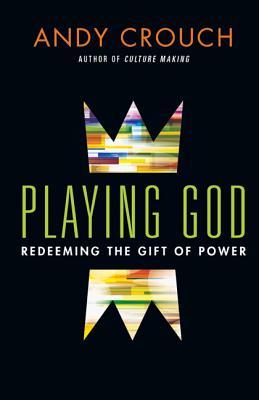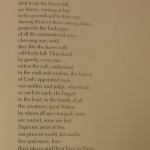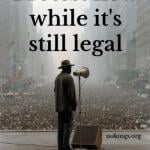 So David Fitch initiated a new conversation on his blog today about Andy Crouch’s new book PLAYING GOD…
So David Fitch initiated a new conversation on his blog today about Andy Crouch’s new book PLAYING GOD…
Affirming much of what Andy offers in the book, David raises the following concern:
All this to say, Crouch’s book is good but Crouch’s book is dangerous. Some may read it and take it as a Christian user’s manual for power and then go out and use their power in a more benevolent way in their businesses or places of work and think they can redeem the world. It may lead us to think that once we get our understanding of power sorted out we can go out and better exercise it. It may lead us into the danger of thinking we can possess God’s good power. For myself, I think this is dangerous.
The Church
Ironically, there is only one place where power can originate like I have described above: the church. Here power (as charisma) is exercised always in faith and dependence upon the Lord who rules from the throne of the ascension (Eph 4:8-11). Here our gifts in Him are never exercised in hierarchy from a position of power over someone, but out of mutual submission, no one overstepping his bounds ( vs 7,11). Here is the model of power and authority Jesus is always trumpeting (Mark 10:41-45, Luke 22:25-27etc.) and Paul is ever displaying (1 Cor 12-14; Rom 12:3ff; Eph 4:7-16 etc). Here Jesus is Lord and we are participants in His power through the gifts? This then becomes the model for all to follow in the world.
Ironically, except for a few pages in (p. 270ff) Andy Crouch does not spend much time on the church. This is curious. Crouch is adamant about locating power in creation and this may be the problem (grounding his account in creation versus the church). To ground one’s view of power in creation offers up the temptation to think we can enter power as people in the world and use it for good outside of the redemptive processes God has released in the church through Jesus Christ. And so, again, we might walk away from Andy’s book believing I too can now exert power in the halls of worldly power and that power can be redeemed somehow by recognizing things like Andy talks about, idolatry, injustice. But I suggest this way of seeing power has gotten us evangelicals in big trouble before (read the Bush adminstration as evidence no. 1). Instead, we must ever submit to the power of God from within the practices of the church, within our gifts, in mutual submission, and only then bring this power of lamb humbly and subversively into the world. I suggest this is how God will bring down strongholds. This is the power, the power of God released in and through the incarnation by the Holy Spirit that shall take over the world.
I agree with David’s assessment here, but I want to add that it is important that we not confine ourselves to a narrow view of the church as solely a religious community, but rather see the (local) church community as a manifestation of the people of God in a particular place, who are seeking to bear witness to God’s reconciliation of ALL things. Thus, churches should be discerning communities that are engaged in things like food, housing, business, community planning, but do so in an intentional, different and cruciform way that bears witness (to the powers) of the reconciling work of God in Christ (Eph 3:9-10). What I appreciate about PLAYING GOD is that it points us in a more wholistic direction of the mission of God, and the work that we are called into as followers of Christ. But I absolutely agree that it’s missing the crucial piece of the church as the nexus where the Spirit of God guides us into this work in our particular places in such a way that BOTH our ends and our means bear witness to the reconciling wisdom of God in Christ.
David proceeds in the comments to make the distinction between God’s action that is preservatory and God’s action that is redemptive, emphasizing that the church’s role is to bear witness to and to seek the latter. This is a useful distinction, and one, incidentally, that I agree with. HOWEVER, this distinction can become detrimental if wielded improperly: i.e., it can become a barrier that keeps us from engaging in the redemptive work to which God is calling us. One key issue is partnerships that we make as congregations, and how we are to understand the nature of such partnerships? My contention is that we can (and should) enter limited partnerships with groups whose mission is something other than the Mission of God, if (and for as long as) we discern such partnerships to be promoting the shalom of our places. So, we might partner with the federal and/or state government (whose function in David’s terminology is preservative at best) to secure funding for an affordable housing project that is in the best interest of our neighbors. Or, we might partner with secular non-profits or other groups of neighbors to work on crucial environmental or economic issues that affect our place. There is an unhelpful reading of the distinction that David makes (and I don’t think he himself thinks this, but his distinction could be misread and has been misread by sectarian groups), that would bar churches from such partnerships, because we are allying with sorts of organizations and power that are, on the whole, not redemptive. My contention is that the church as a discerning community under the Lordship of Jesus, can and should enter such partnerships as we discern to be beneficial for the flourishing of our places. But we should always enter and engage in such partnerships, with a firm sense of our identity as the followers of Christ, and exit when we discern that are no longer capable of functioning distinctively as Christ’s body in that partnership.
It is in such partnerships/alliances that the manifold wisdom of God is made known in meaningful and substantial ways to the rulers and powers and authorities (Eph 3:10).












